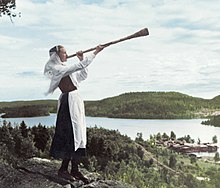
The birch trumpet (Norwegian: neverlur, Swedish: näverlur, Latvian: tās̆u taure, Lithuanian: ragas, daudytė, Finnish: tuohitorvi, Estonian: karjapasun) is a type of natural trumpet made of spruce covered with birch bark, known in Norway, Sweden, Finland, England, Denmark, Latvia, Lithuania, Belarus and Estonia. Even cruder and less durable versions were made of plain birch bark. They are associated with the early European Chalet culture, where it was presumably used to intimidate predators, frighten supernatural enemies, and convene council meetings.
Usually, the neverlur is a natural horn, having no fingerholes or valves. Normally, a player can play 10 tones from the natural scale on the instrument. In the modern era, the neverlur is primarily a cultural curiosity, used for the occasional fanfare.

In Finland, the birch trumpet, locally known as the tuohitorvi, comes in different varieties. Some instruments are built as natural horns and used for signalling, usually by shepherds, whereas others are built in the style of the mute cornett and have fingerholes for melody playing.

Tolga kulturskole (culture school) in Norway regularly teaches playing the neverlur to all interested people living in the municipality.
The oldest recovered näverlur in Sweden dates back to the 10th century, and resembles earlier bronze trumpets.
Contemporary manufacturers
Norway
- Magnar Storbækken at the company Naturinstrumenter in Tolga
Sweden

- Rune Selén was Sweden's best known näverlur manufacturer. He manufactured more than 11000 näverlurar between 1959 and 2005 when he retired because of dust allergy. He died 28 October 2011.
- Lisa Byers Runberg in Alunda. She was taught by Rune Selén. Her husband Per Runberg is a folk musician and riksspelman.
- Jan Nordkvist at the company Lurmakaren in Tällberg
Similar and related instruments
- With length up to 4–5 meters are known from the Alps (alphorn), Carpathian Mountains, and Pyrenees.
- Midwinter horn mainly known from the border area between Germany and Netherlands in Bentheim and Twente. It is only played in the period between Advent Sunday and Epiphany
- Büchel (Switzerland)
- Ligawka (Poland)
- Karjapasun (Estonia)
- Trembita
See also
References
- "Pučiamieji instrumenatai". www.folkinstruments.lt. Retrieved 23 April 2018.
- "Musikk i Latvia". Store norske leksikon (in Norwegian). Store norske leksikon AS. Retrieved 30 July 2013.
- "The Music of the Baltic States". Guide to World Music. World Music Network. 16 May 2011. Archived from the original on 19 December 2013. Retrieved 30 July 2013.
- Ellen Vibeke Nygjelten (28 February 2013). "Neverlur". The web pages of the Municipality of Tolga (in Norwegian). The Municipality of Tolga. Archived from the original on 5 March 2016. Retrieved 30 July 2013.
- Magnar Storbækken (1 September 2010). "Naturinstrumenter". Company web pages (in Norwegian and English). Naturinstrumenter AS. p. Neverlur / Birch bark lure. Retrieved 30 July 2013.
- "Rune Seléns Kulturfond och Västgöta Horn & Lurblåsare!" (in Swedish). Arbetsgruppen för Rune Seléns Kulturfond. Retrieved 30 July 2013.
- "Svensk sommarmusik, hyllningskonsert" (in Swedish). Stockholms Symfoniorkester. 2005. Retrieved 30 July 2013.
- Anna Ehn (25 April 2006). "Näverlurar från Alunda till Shakespearepjäs i London". Uppsala Nya Tidning (in Swedish). Retrieved 30 July 2013.
- Anna Ehn (25 April 2006). "Näverlurar på export till Shakespearteater" (PDF). Uppsala Nya Tidning (in Swedish). Retrieved 30 July 2013.
- sv:Per Runberg
- Jan Nordkvist. "Lurmakaren" (in Swedish and English). Lurmakaren. Retrieved 30 July 2013.
- "lur – blåseinstrument". Store norske leksikon (in Norwegian). Store norske leksikon AS. Retrieved 30 July 2013.
External links
- Professional musician Sissel Morken Gullord has specialized in playing the natural horn working with the leading Baroque orchestras in Scandinavia and playing the (never)lur and the billy goat's horn (bukkehorn).
- Sissel Morken Gullord plays the cattle call "Koma guta liggje" on a neverlur on a Norwegian seter (shieling) (YouTube video)
- The Wooden Lurs part of The Nordic Lurs part of O.J.'s Trumpet Page
| Finnish folk music | |
|---|---|
| General | |
| Tune Types |
|
| Instruments | |
| Scales | |
| Relations | |
| Norwegian folk music | |
|---|---|
| General | |
| Tune Types |
|
| Instruments | |
| Scales | |
| Relations | |
| Miscellaneous | |
| Swedish folk music | |
|---|---|
| General | |
| Tune Types |
|
| Instruments | |
| Scales | |
| Relations | |
| Miscellaneous | |
| Trumpets and cornets | |
|---|---|
| By range | Contrabass > Bass > Standard > Soprano > Piccolo |
| Variants | |
| Parts and technique | |
| Other | |